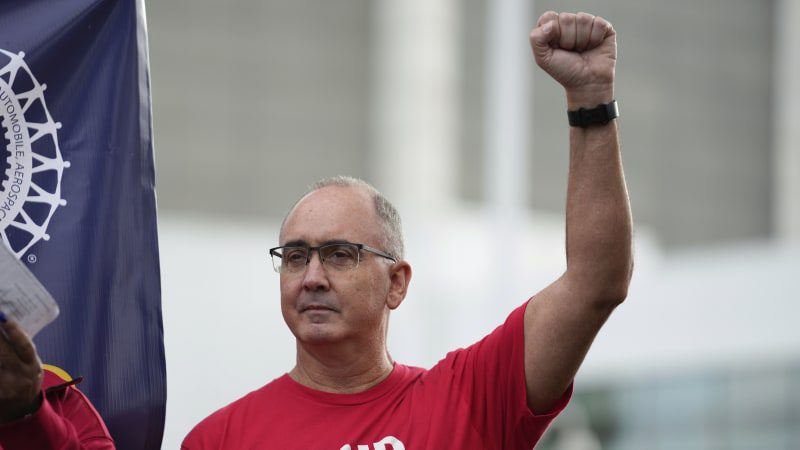UAW President Shawn Fain sees ‘ugly’ labor strife ahead at Ford battery plants

The United Auto Workers’ president says there could be a nasty fight ahead to organize workers at Ford Motor Co.’s jointly-owned electric battery plants, after the company declined to join its competitors in agreeing to ease the unionization process.
“Stellantis and GM agreeing to these terms, in effect buys them labor peace as we move forward,” UAW head Shawn Fain said in an interview with Bloomberg News. At Ford, in contrast, he said, “that could get ugly.”
Ford declined to comment. General Motors Co. and Stellantis NV didn’t immediately comment in response to inquiries.
Because the automakers partnered with South Korean firms to mount the joint ventures, those plants are considered separate entities, not governed by the master contract that determines wages and benefits for auto workers. But terms in the tentative agreements will allow current GM and Stellantis employees to be “leased” to their joint ventures, while remaining employed by the Detroit firms, Fain said. That way they don’t take a pay cut.
The two companies have also agreed to a “card check” process to make it quicker and easier for new workers at those joint ventures to unionize, according to Fain. And if they do, he said, they will then be covered under the existing master agreement.
New employees at the joint ventures will get 75% of the pay rates in the master agreement, the UAW president said, but the union will aim to eliminate that gap when it renegotiates the deal in 2028. “The key thing was getting it under the master,” he said.
During the strike, Ford Chief Executive Officer Jim Farley accused the UAW of “holding the deal hostage over battery plants” as the automaker resisted bringing its joint-venture operations under the union’s master agreement.
Ford has said it will allow its hourly workers to transfer into its wholly owned electric truck assembly plant under construction in Tennessee and the battery plant it has planned in Marshall, Michigan, which it paused while negotiations unfolded.
With EV demand waning, Farley last week said Ford would delay construction of one of its three joint venture plants, a proposed second battery plant in Kentucky, as the automaker pushes back $12 billion in planned EV spending and throttles back ambitious production plans for plug-in models.
Under the tentative agreements with the Big Three, union members will get 11% raises as soon as the new contracts are ratified. Over the life of the contract, the automakers agreed to give a 25% wage increase and a restoration in cost-of-living allowance, which takes top pay up 33% over that time, as well as giving new workers a faster progression to the top wage of $42 an hour.
By the time the Big Three contracts expire in 2028, Fain said, he’s confident the UAW will have organized workers at all the Big Three joint ventures that are up and running, and will have brought them under the master agreement. He’s also aiming to organize the Big Three’s competitors, including Tesla Inc., whose CEO, Elon Musk, is staunchly anti-union.
The UAW’s record-breaking deals at the Big Three are already drawing interest from non-union workers, and forcing non-union firms like Toyota to hike their pay, Fain said. “That’s the effect of the having a thriving vibrant UAW that’s actually doing the right thing and fighting for the workers.”



